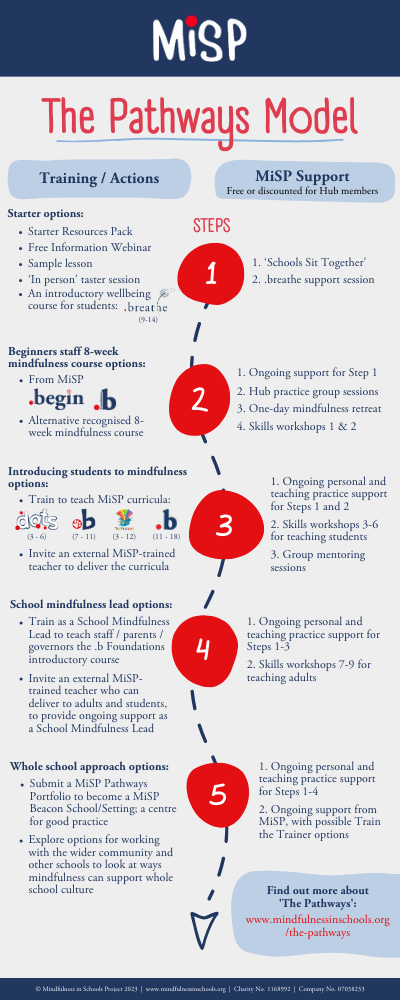By Faiy Rushton – Education and Training Development Manager
The Pathways model is a framework designed to help individuals, schools and educational settings explore the benefits of mindfulness and clearly see the extent of MiSP’s potential support. Please see our at-a-glance Pathways Model infographic.

Back in May we launched the concept of the Pathways and Step 1 (the information gathering stage).
We are delighted to now announce that the Step 2 resources are ready and available in the Hub as part of the Pathways framework!
Step 2 focuses on introducing educators to learning mindfulness for their own wellbeing. Anyone who has already completed an 8 week course and is a Hub Member can automatically access Step 2 resources via the Hub.
For anyone looking to move from Step 1 to Step 2 of the Pathways, we recommend completing a teacher-led experiential introduction to mindfulness. This could be through joining:
- A MiSP 8 week .begin course (our online MiSP instructor-led course)
- The 8 week .b Foundations course ( an ‘in person’ equivalent to .begin, please check our Teacher Map to find a local MiSP trained .b Foundations teacher)
- An approved 8 week mindfulness course from an alternative provider.
Why mindfulness for educational staff and how Step 2 resources support?
Supporting the wellbeing of adults in educational settings is essential for those individuals as well as to the development of a thriving whole school culture. Alongside other interventions, mindfulness can play a part in both – i.e. improving the wellbeing of educational staff and, in turn, supporting a whole school approach to flourishing.
Learning mindfulness can also be an important first step to going on to learn how to introduce it to children and young people in the school or other educational setting.
Research shows us that staff learning and practising mindfulness can reduce burnout, positively impact personal wellbeing and the climate of the whole school. There has also been research that indicates that the wellbeing of educational staff affects the wellbeing of children and young people, and vice versa, so addressing the improvement of staff wellbeing is a crucial part of any whole school approach.
As well as completing an 8-week training, the positive benefits of staff learning mindfulness can be further sustained with the help of MiSP’s programme of ongoing support. With the aim of cultivating and nurturing personal practice alongside exploring how mindfulness might support us in our working life and approach to working with children and young people, MiSP offers Hub members support across the Pathways, including now at Step 2, e.g.:
Please note, Hub membership is open to anyone who has taken a .begin, .b Foundations or other approved 8 week course. For details of how to become a Hub member, please see here.
Keys to successful implementation and how Step 2 resources support?
Mindfulness can start with one or more passionate teacher(s) or other educational member(s) of staff. MiSP seeks to use its expertise and experience to support such teachers and educational staff with creating the best conditions for developing a sustainable model for implementing mindfulness in their setting.
Research conducted by Stephanie Wilde et al in 2019, for instance, showed that there are certain key factors in the successful implementation of mindfulness in schools, including;
- Understanding that the implementation process usually takes time
- Having a shared supportive ethos/climate ideally to begin with
- Developing, over time, a shared language about mindfulness
- Enabling students and staff to be well informed about what mindfulness is (and isn’t).
You will see, therefore, that for Step 2 we have provided resources to support educational staff in creating a shared language and understanding about mindfulness with adults and students in their community. These include:
- Student mindfulness assembly ideas, presentation and notes
- Staff/adult introduction to mindfulness presentation and notes
- Ideas, resources and support sessions
- Reflective tools.
Please note, if you would like to introduce mindfulness to students but don’t yet have any teachers or educational staff ‘in house’ trained to teach MiSP student courses in your setting, please consider finding a trained teacher in your area via our Trained Teacher Maps.
A reminder of resources for Steps (3-5) still to come
Launching one step at a time over the next year will also be the following Steps with their primary focus marked in bold:
- Step 3 – Develop a model for mindfulness taught in-house to students and build a community to share coordination of mindfulness initiatives.
- Step 4 – Embed mindfulness learning and approaches throughout the setting where appropriate.
- Step 5 – Sustain and Share, further ensuring your mindfulness approaches are as sustainable as possible and can also be shared with and inspire others through becoming a MiSP Beacon School/Setting/Trust.
Finally – why approach mindfulness in this way?
Since 2009, MiSP has had the privilege of working with a wide variety of schools, other educational settings, Local Education Authorities and Multi Academy Trusts, helping them to support the wellbeing and mental health of both young people and adults who work within them, as well as the broader community of families, governing bodies, other service providers and volunteers who support those schools.
We have collated examples of successful implementation of mindfulness-based initiatives and key learning from where things have not quite gone to plan. The Pathways approach has evolved out of this rich learning.
The benefits of ‘The Pathways’ model include a clear but flexible structure, expert support, tried and tested resources, and a collaborative model that encourages participation from staff and students.
Ultimately, our goal is to empower schools and communities to bring mindfulness to the heart of educational life, supporting individual and community wellbeing.
We welcome feedback and the Pathways framework has been designed to evolve in response to our community’s needs.
If you have any questions or further ideas for development, please contact enquiries@mindfulnessinschools.org.
Please join us on this journey by exploring ‘The Pathways’ today!
